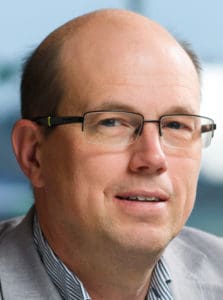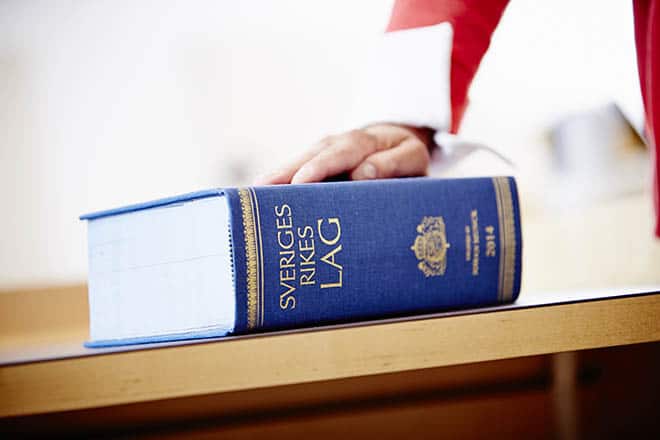The amendments to the Aliens Act which came into force on 20 July this year, primarily the stricter requirements regarding the ability to support oneself financially, make it much more difficult for foreign doctoral candidates and researchers to stay in Sweden long term. The Aliens Act and the Aliens Ordinance state what the self-support requirements regarding permanent residence entail.

“The form of income must be salary and can also be compensation that runs parallel with employment, such as sickness benefit and parental benefit, but it may not be compensation through the unemployment insurance system or the like, nor income from subsidised employment,” says SULF’s chief negotiator, Robert Andersson.
Long-term employment required
In order for the self-support requirement to be regarded as fulfilled, the source of income must have a certain degree of stability. The Swedish Migration Agency has issued a legal position where it concludes that the income must have a duration of at least 18 months from the time of the assessment of the application for permanent residence.
In the first instance, this should be permanent employment or an own company that is judged to be sufficiently stable and profitable. Fixed-term employment can also count if it is of sufficient duration. It is possible that probationary employment would be approved, but then the Migration Agency must assess the probability of it becoming permanent employment
“Even if a fixed-term position is for 18 months, that is not enough because the time is counted as 18 months from the time the Migration Board makes its decision,” says Andersson. “By then, the processing time has been added and it is uncertain how long this will be in each individual case. So you may need to have a fixed-term position of upwards of two years to be on the safe side.”
It has also been pointed out that those who already have a residence permit may not apply for a new permit until there are 14 days left until their old one expires. “If they get a new temporary job before that, they are still not allowed to apply for a permanent residence permit until just before their temporary residence permit expires.”
“It impacts everyone”
Many were surprised by the change to the law, which came in the middle of the summer and without any transitional provisions.
“It impacts everyone,” says Andersson, “even those who applied earlier and on the basis of the rules that were in force when they made their application. So everyone who did not receive a decision regarding their permanent residence permit application before July 20 is covered by these new rules and must fulfil the requirement, regardless of when they applied. It will create major difficulties.”
Those who have their application for a permanent residence permit rejected can be assessed for a temporary residence permit instead. “So it is not certain that they will have to leave the country. If you receive a temporary residence permit instead of a permanent one, you can appeal if the Migration Agency has rejected your application on the grounds that you do not meet the self-support requirement or the requirement regarding good conduct.
If, on the other hand, your application is rejected for another reason, the most common being that you are not considered to have met the requirement of four years with the right type of residence permit or that you have been awarded a doctorate ”too quickly”, you may not appeal if you have been granted a temporary residence permit.”
More difficult for family members
The new rules on means of financial support also affect accompanying family members.
“Previously, for example, a doctoral candidate’s family members could apply for a permanent residence permit at the same time as the doctoral candidate and be granted permanent residence more or less automatically if the doctoral candidate received it,” continues Andersson. But now each person must meet the requirements themselves.
“The family members must have had a residence permit for three years. And then they also have to be able to support themselves financially. This is a major difference from the previous rules, because now family members really need to have a job themselves.”
A doctoral candidate applying for a permanent residence permit still needs to have had a residence permit for four years. Children under the age of 18, on the other hand, do not have to meet any self-support requirement to be granted a permanent residence permit. They do, however, need to have had a residence permit for three years.
Robert Andersson points out that for people applying for a residence permit, there are now two different financial support requirements, depending on whether they are applying for a permanent residence permit or a time-limited residence permit.
“A temporary residence permit does not necessarily require the applicant to have income from work. Unemployment benefit or bank savings can also be approved. But for a permanent residence permit, you more or less have to have a job or your own company.”
Even more difficult for postdocs with grants
Doctoral candidates and researchers with precarious employment are thus particularly at risk under the new regulations. It is even more tricky for the researchers, usually postdocs, who are funded by scholarships.
The way that the self-support requirement for a permanent residence permit is formulated, scholarship recipients cannot qualify. And it is not a small group that has scholarships as the main source of income. Universitetsläraren has previously revealed that at least 20 per cent of postdocs in Sweden have a scholarship as their source of income.
“The scholarship itself cannot qualify you for a permanent residence permit, but at best only a temporary residence permit. People on scholarships are not entitled to receive unemployment benefit either, so they are also unable to meet the less strict requirement for a temporary residence permit,” says Robert Andersson.
All in all, the new rules on self-support requirements mean significantly worse conditions for young foreign researchers, who normally switch between different fixed-term employment positions.
It will also be very difficult for doctoral candidates to obtain a permanent residence permit during their doctoral studies, because the application can only be made after four years, and then it is not very likely that they can show that they have an employment period of 18 months left.
“This will be a lot of uncertainty for everyone concerned,” says Andersson.
“Jeopardising the skills supply”
Individual researchers are not the only ones affected. SULF wrote in its consultation response at the beginning of the year that the new regulations may negatively affect Sweden’s attractiveness to researchers. The Swedish Migration Agency and the Confederation of Swedish Enterprise also came to the same conclusion.
Robert Andersson points out that Sweden has invested large sums in educating and developing doctoral candidates and researchers, many of whom will now not be able or willing to stay in Sweden but will instead look for better alternatives elsewhere.
“That is a great waste of resources, and it also risks jeopardising the skills supply within higher education and other parts of society and the economy,” he continues. “SULF has already made it clear previously that these requirements regarding self-support will pose problems. In practice, we risk a return to the situation that existed before 2014, when doctoral candidates could not apply for a permanent residence permit but could at best be granted a time-limited residence permit – if they managed to get a new job directly after completing their doctorate. But it seems that politicians are so preoccupied with asylum immigration that they have not thought about these aspects.”
















